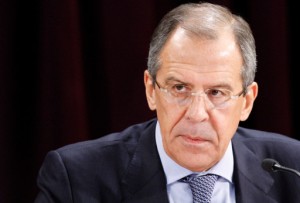 With military and commercial interests in Syria, Russia initially backed the regime of President Bashar al-Assad. But with constant progress on the side of the rebels, Russia is reconsidering its status (questionable motive, but at least supporting a dictatorship is becoming less appealing to the country).
With military and commercial interests in Syria, Russia initially backed the regime of President Bashar al-Assad. But with constant progress on the side of the rebels, Russia is reconsidering its status (questionable motive, but at least supporting a dictatorship is becoming less appealing to the country).Russia's Foreign Minister, Sergei Lavrov, revealed an interest in beginning talks with opposition leader Ahmad Mouaz al-Khatib--an offer that was promptly rejected by al-Khatib. Stating that the opposition was unwilling to travel to Russia, al-Khatib also said that he wants an apology from Russia for supporting Assad's regime. He expects a "clear condemnation of the crimes committed by the Syrian regime." Perhaps a fair request, but seemingly puerile within the given context.
However, this does not mean that the opposition's cooperation is out of the question. Russia has already expressed that they are encouraging Assad to come to a political settlement , and Putin recently said that Russia is "not preoccupied that much with the fate of the Syrian regime." Furthermore, negotiations could take place in a neutral country rather than within Moscow.
Russian Deputy Foreign Minister Mikhail Bogdanov, U.S. Undersecretary of State William Burns, and UN-Arab League Envoy Lakhdar Brahimi plan to meet in January in order to discuss and incite change.
Will efforts to reach peace prove successful with Russia involved? If these efforts are successful, will they be sustainable or will they eventually lead to the production of another corrupt regime?
1 comment:
I think the situation is analogous to what happened in Egypt two years ago. Ths US, like Russia with Syria, had a peaceful, profitable realtionship with Mubarack's regime that it was reluctant to immediately condemn the regime. I don't think the involvement of Russia will have any sort of significant impact in terms of reaching an immediate peace resolution or reversing the tide. It is evident that Assad is going to loose, and the Russian's switching merely confirms this fact. And conversely, the Russian would not have displayed this gesture of friendship if the Assad's regime were to be winning now.
Post a Comment